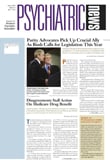Cultural competency standards look good in guidelines, position statements, and other official documents, but this doesn’t necessarily mean these standards are being put to work for patients.
James Thompson, M.D., M.P.H., director of APA’s Division of Education, Minority, and National Programs and clinical professor of psychiatry at the University of Maryland School of Medicine, spoke at the annual meeting of the American Association of Directors of Psychiatric Residency Training (AADPRT) about the importance of teaching cultural competency in psychiatry residency programs (
see facing page).
Thompson helped to develop courses that build cultural awareness in residents at the University of Maryland/Sheppard Pratt psychiatry residency program and told training directors that residents there are enjoying themselves while learning about cultural issues in psychiatry.
In a recent interview with Psychiatric News, Lisa Green-Paden, M.D., director of multicultural affairs for the University of Maryland training program, said that psychiatry residents are excused from their clinical duties for one day in March each year to participate in Cultural Diversity Day. The focus of the event is make residents aware of cultural differences in the patients they treat and the issues that residents may encounter when they treat patients who have cultural backgrounds different from theirs.
University of Maryland psychiatry residents plan and develop the lectures and workshops for each Cultural Diversity Day under a different theme each year. Spirituality and alternative medicine dominated this year’s event, in part because of the terrorist attacks of September 11 in New York and Washington, D.C., Green-Paden said.
Panelists in one of the workshops spoke to residents about spirituality; the panel consisted of Muslim, Buddhist, Jewish, and Christian spiritual leaders. Residents also learned about how acupuncture has been used in the treatment of substance abuse.
The theme of last year’s Cultural Diversity Day was intercultural communication. A linguist lectured to residents, and Green-Paden led a workshop on how slang is used in different languages.
For the past two years, Cultural Diversity Day has been a treat for the taste buds, too. The residents—or residents’ families, in some cases—cooked meals traditionally served in their native cultures for one another to eat. Among the countries represented were Egypt, India, Greece, Nigeria, and Israel.
As part of their cultural training, first- and second-year psychiatric residents at the University of Maryland take didactic courses in cultural psychiatry. In the last two years of training, residents focus on sociocultural issues that arise in psychotherapy and combine cultural training with case conferences.
Francis Lu, M.D., a professor of clinical psychiatry and director of the Cultural Competence and Diversity Program in the department of psychiatry at San Francisco General Hospital (SFGH), is also getting residents up to speed on treating patients from diverse backgrounds.
He talked about how psychiatry residents at the University of California at San Francisco (UCSF) are working with staff and patients through the SFGH program.
In their first year of residency, UCSF residents rotate through four of seven ethnic minority-focused inpatient programs at the hospital in which nurses, social workers, psychiatrists, and occupational therapists provide care with the cultural needs of certain populations in mind.
At the hospital, there are specialized programs for Asian, African-American, and Hispanic patients, as well as programs for women patients; patients with HIV/AIDS; gay, lesbian, bisexual, and transgender patients; and patients in the custody of the San Francisco Sheriff’s Department.
Staff members on the units often share the same culture as those of the patients—but not in all cases—and can speak the same languages. They also have an advanced understanding of patients’ cultural backgrounds. Staff working in the Asian focus program speak 14 Asian languages and a number of Chinese dialects, for instance.
The Cultural Competence and Diversity program at SFGH also consists of a task force on spirituality and task forces dedicated to the unique cultural issues of six minority populations. Task force members regularly educate staff and faculty in the department of psychiatry through seminars, workshops, and grand rounds, Lu said. ▪
